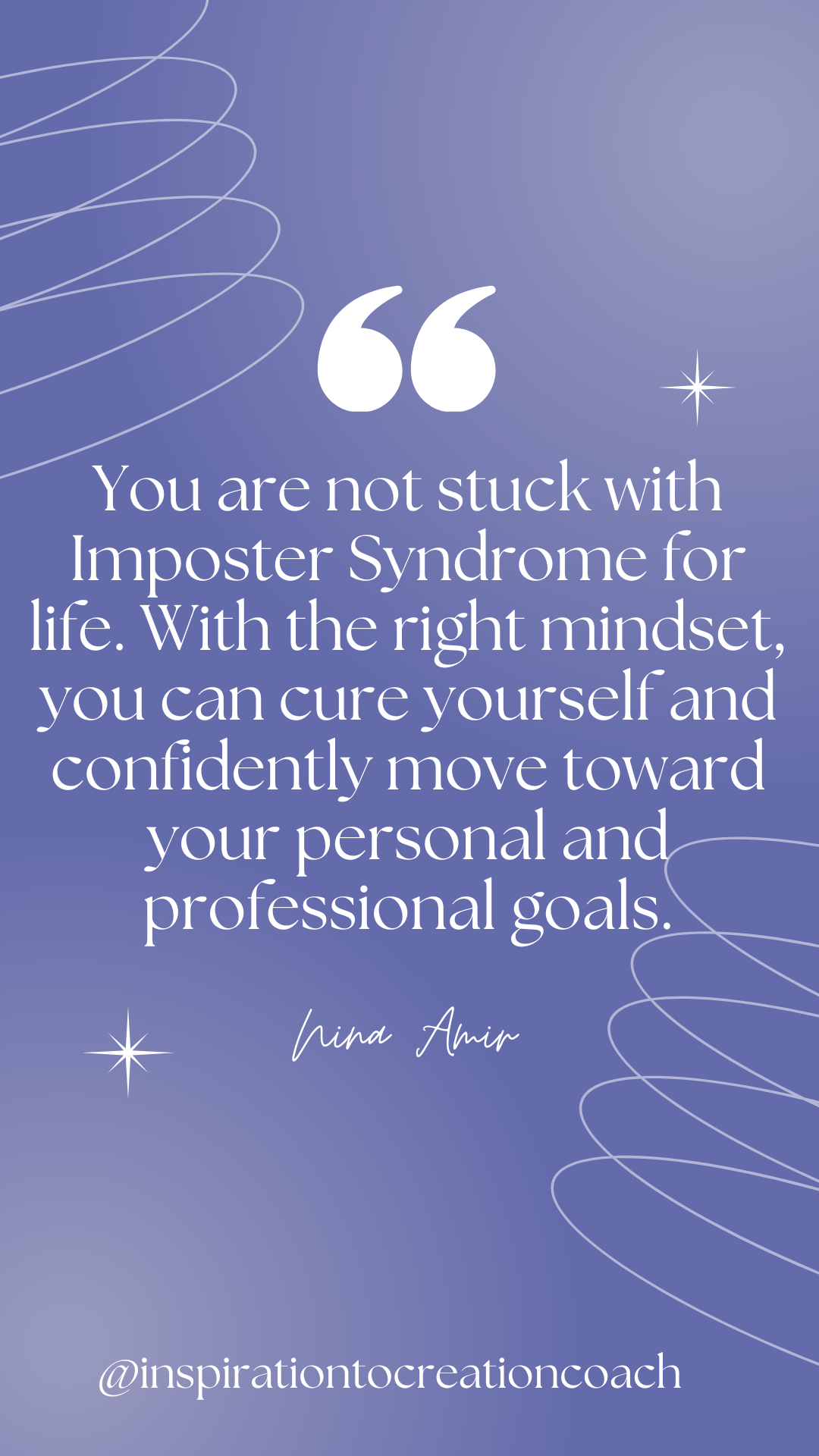Have you ever doubted your abilities, accomplishments, and talents to the extent that you feel like a fraud? If so, you might be suffering from Imposter Syndrome. And this “condition” can keep you from realizing—or recognizing—your potential. Simply said, it holds you back.
Imposter Syndrome affects people from all walks of life, including entrepreneurs, executives, students, and even accomplished individuals with significant achievements. If I’m honest, I suffer from it, too, and I bet some people you know would say the same.
My Imposter Syndrome rears its head occasionally. For instance, sometimes I don’t feel qualified or that my expertise is good enough for a situation or opportunity. Then I hold back. For example, I may not put myself out there as a candidate for a speaking, coaching, or writing opportunity.
Or I may take action and show up for an opportunity but fail to demonstrate confidence in my capabilities. Then, people feel my lack of confidence and don’t choose or hire me.
Do You have Imposter Syndrome?
If you aren’t sure you’ve got Imposter Syndrome, here are a few more symptoms:
- You feel you don’t deserve the praise you receive or your achievements.
- You are afraid someone could expose you as a fraud.
- You often ask yourself if you’re pretending to know things you don’t know.
- You feel inadequate.
- You fear failure.
- You find it difficult to accept compliments.
- You believe you have somehow managed to trick others into believing they are qualified.
Sound like you?
If so, let’s explore this “malady” so you don’t become overly anxious about it.
What is Imposter Syndrome?
Imposter syndrome is a psychological pattern in which individuals doubt their accomplishments and persistently fear being exposed as frauds. It can affect anyone, regardless of age, gender, or professional experience. Also, it can significantly impact their self-esteem, motivation, and performance.
Most humans occasionally doubt their abilities or competency. Doubt is a natural feeling that often surfaces during times of challenge, like when you take on a difficult task, start a new job, or get a promotion. And many of us undervalue our accomplishments or skills and believe our success is the result of luck or chance, which raises our level of self-doubt.
When these feelings or mindsets become persistent and consume you to the point where you fear exposure as a fraud or a phony, the condition gets classified as Imposter Syndrome. However, imposter syndrome is not a medical diagnosis.
What Causes Imposter Syndrome?
Imposter syndrome has many causes, but the most common is pressure to succeed in a society that devalues failure. We’ve been programmed since childhood to believe our worth primarily is judged by our ability to achieve or be successful. In some cases, we’ve been told failure is bad or unacceptable. This deprives us of the opportunity to learn and grow from failure.
Plus, we’ve been taught that we must constantly strive for higher levels of success. Thus, we don’t stop to celebrate our achievements. When successes are not honored and achievements are brushed off as expectations, we struggle to recognize our successes at all. And that leads us to believe we’ve not accomplished anything of note.
Social media also has contributed to the rise in people suffering from imposter syndrome. Since social media tends to portray the best of people’s lives, it’s easy for those on the outside looking in to compare themselves to their peers on virtual platforms.
Such comparisons make you feel you are not as good, worthy, skilled, pretty, or wealthy as those you see on social media. And this feeds your sense of being a fraud.
5 Ways Imposter Syndrome Holds You Back
While the symptoms of Imposter Syndrome can be unpleasant, the result of having this condition for an extended period is worse. Not only does Imposter Syndrome hold you back and limit your potential in various ways, but it also stops you from enjoying the success you achieve. In fact, likely, you can’t acknowledge your success—even when you have evidence of your competence, achievements, and gifts.
The following are five ways Imposter Syndrome holds you back in all life arenas.
1. Procrastination and Perfectionism
One of the primary ways Imposter Syndrome holds you back is by encouraging procrastination and perfectionism. This leads to delays in completing and overthinking tasks.
This makes sense. If you doubt you are good enough to complete tasks or might be exposed as a fraud if you do, why would you jump right in, do the work, and complete the job? It makes sense that, instead, you would avoid the task or spend inordinate amounts of time trying to get the job done just right.
2. Fear of Failure
Imposter Syndrome often leads to a fear of failure, which can create a cycle of perfectionism and delayed action. Sometimes this fear becomes so pronounced that it prevents you from taking risks or choosing to pursue new opportunities.
Of course, those with Imposter Syndrome also fear being found out. And if you are discovered to be an imposter, that represents another type of failure. In a professional context, if you were found to be a phony, this could end your career.
As a result of your fear of failure, you limit your growth and potential by not moving toward greater achievements.
3. Underachievement
If you feel that your skills and accomplishments aren’t “real,” you may become less motivated, engaged, and ambitious. This can lead to underachievement, missed opportunities, and dissatisfaction with your life or work.
You may already realize this, but underachievers feel challenged to succeed. So, if you don’t stretch for bigger goals, reaching your human potential is impossible.
4. Limited Networks
Imposter Syndrome often causes people to withdraw as a way to “hide” and avoid discovery. Thus, if you suffer from this condition, you could become reluctant to seek networking opportunities or connect with peers for fear of exposure.
As a result, you limit the number of connections you make professionally. Unfortunately, this can lead to missed career opportunities.
On a personal level, withdrawing can cause you to feel disconnected from friends and family, resulting in feeling alone and isolated.
5. Depression and Anxiety
Last but not least, Imposter Syndrome can lead to symptoms of depression and anxiety, low self-confidence, low self-esteem, and trouble sleeping. These symptoms can have severe consequences for your career and personal life if left unchecked.
The Role of Self-Talk in Curing Imposter Syndrome
 Here’s some good news: you are not stuck with Imposter Syndrome for life. With the right mindset, you can cure yourself and confidently move toward your personal and professional goals.
Here’s some good news: you are not stuck with Imposter Syndrome for life. With the right mindset, you can cure yourself and confidently move toward your personal and professional goals.
Identifying and acknowledging the existence of Imposter Syndrome can be challenging, but it’s an essential first step to overcoming it. Once you recognize you’re struggling with it, the next step involves confronting your negative thoughts and challenging them.
After all, that’s the real cause of your malady—negative mental chatter claiming you are a fraud.
To reduce your symptoms, become aware of your negative thought patterns—everything you tell yourself about being a phony. For example, if you catch yourself thinking, “I am not good enough” or “I don’t deserve this,” reframe those negative thoughts into positive self-talk.
Also, focus on your strengths and achievements. Remind yourself often that you have the ability and skills to overcome challenges. Then, acknowledge your accomplishments.
If you continue this practice, you will feel a greater sense of self-worth and confidence. Plus, your mental chatter will become positive, reminding you of your ability to succeed.
Practical Tips for Curing Imposter Syndrome
Here are some other practical tips for curing Imposter Syndrome:
1. Recognize and Acknowledge Your Achievements
Imposter Syndrome often stems from believing your successes are not deserved or earned. Therefore, it’s essential to identify your accomplishments and give yourself credit for them.
Make a list of your professional and personal achievements, whether small or significant. Then reflect on what you did to accomplish them.
If you can’t do this alone, seek out trusted colleagues or family and ask them to point out or acknowledge your skills, accomplishments, and abilities. This can prove a great way to challenge your negative beliefs, especially if done with an objective evaluation.
2. Take Ownership of Your Challenges
Everyone has challenges and setbacks in their personal and professional lives. Instead of avoiding or blaming them for failure or challenge, take ownership of them. Then, use them as opportunities to learn and grow.
Recognize that failure is a necessary part of the learning process and doesn’t diminish your value as a person or professional. And it definitely does not make you an imposter.
3. Seek Support and Feedback
Imposter Syndrome can make you feel isolated and alone as if you are the only one struggling with self-doubt. Therefore, it’s important to remember that everyone experiences Imposter Syndrome at some point.
Seek support from friends, family, or colleagues who can offer encouragement and feedback. You may be surprised to learn that others see you in a more positive light than you do—or that they have Imposter Syndrome, too.
4. Practice Self-Care
Taking care of yourself is essential for your physical and mental well-being. Make self-care a daily priority by engaging in activities that make you happy and relaxed, such as exercise, meditation, or hobbies.
When you feel good about yourself, you are more likely to feel confident and capable.
You Are Not an Imposter
Imposter Syndrome is a real and often debilitating mental state many people face in their personal and professional lives. However, it is crucial to recognize that these feelings of inadequacy are not rooted in reality. They simply aren’t true and don’t reflect your true worth as a person or your abilities as a professional.
Your thoughts about not being enough, being inadequate, or being a fraud are untrue stories you tell yourself. They are your interpretations of events or experiences, but they are not based in fact.
In fact, you are not an imposter. Unfortunately, your mind just wants you to believe that.
Taking proactive steps to address Imposter Syndrome can build confidence in your abilities and achieve greater success and satisfaction. Ultimately, the key to overcoming imposter syndrome is to take control of your mental self-talk, embrace your unique strengths and skills, and acknowledge your achievements. With a new positive mindset, you will no longer hold yourself back. That means you can confidently move toward your goals and achieve your full potential personally and professionally.
Do you struggle with Imposter Syndrome? Tell me in a comment below. And please share this post with a friend or on social media.
If you want to activate your 10 human drives so you nourish your soul consistently, let’s chat. Get on my calendar here. Or join the Inspired Creator Community for group transformational coaching every month. (In March 2023, we begin a new series related to the human drives.)
 It’s time to transform, is it not? Join the Inspired Creator Community. You probably already realize that you need to change from the inside out. That’s how you become a person who does the things that allow you to create your desires. As a member, you get access to intuitive transformational coaching, world-class personal growth coaching, and strategies for living a life that feeds your soul. And you will discover that you are a powerful creator able to create what you want (not what you don’t want). Join now!
It’s time to transform, is it not? Join the Inspired Creator Community. You probably already realize that you need to change from the inside out. That’s how you become a person who does the things that allow you to create your desires. As a member, you get access to intuitive transformational coaching, world-class personal growth coaching, and strategies for living a life that feeds your soul. And you will discover that you are a powerful creator able to create what you want (not what you don’t want). Join now!Photo courtesy of: Gabriel Tovar


